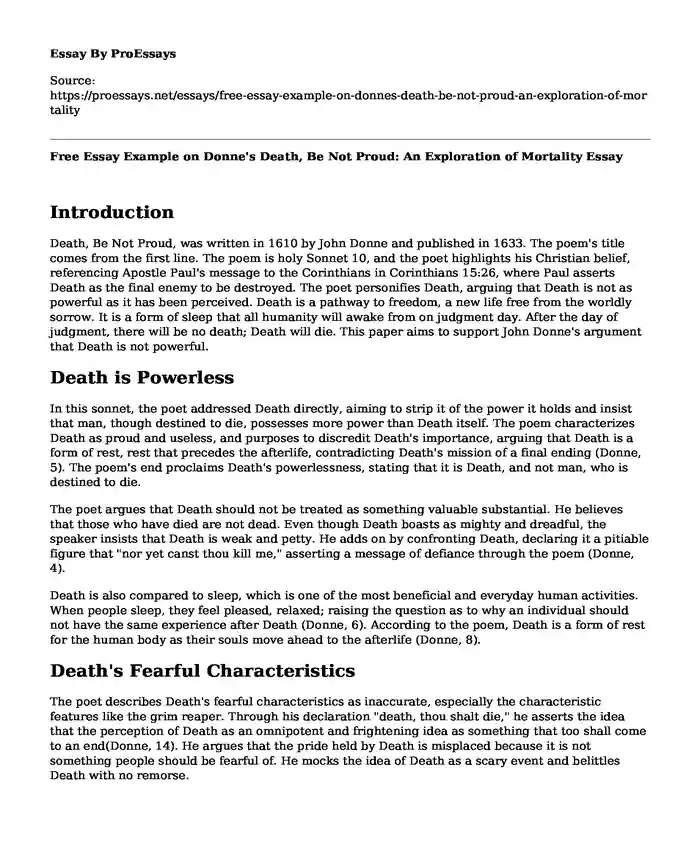Introduction
Death, Be Not Proud, was written in 1610 by John Donne and published in 1633. The poem's title comes from the first line. The poem is holy Sonnet 10, and the poet highlights his Christian belief, referencing Apostle Paul's message to the Corinthians in Corinthians 15:26, where Paul asserts Death as the final enemy to be destroyed. The poet personifies Death, arguing that Death is not as powerful as it has been perceived. Death is a pathway to freedom, a new life free from the worldly sorrow. It is a form of sleep that all humanity will awake from on judgment day. After the day of judgment, there will be no death; Death will die. This paper aims to support John Donne's argument that Death is not powerful.
Death is Powerless
In this sonnet, the poet addressed Death directly, aiming to strip it of the power it holds and insist that man, though destined to die, possesses more power than Death itself. The poem characterizes Death as proud and useless, and purposes to discredit Death's importance, arguing that Death is a form of rest, rest that precedes the afterlife, contradicting Death's mission of a final ending (Donne, 5). The poem's end proclaims Death's powerlessness, stating that it is Death, and not man, who is destined to die.
The poet argues that Death should not be treated as something valuable substantial. He believes that those who have died are not dead. Even though Death boasts as mighty and dreadful, the speaker insists that Death is weak and petty. He adds on by confronting Death, declaring it a pitiable figure that "nor yet canst thou kill me," asserting a message of defiance through the poem (Donne, 4).
Death is also compared to sleep, which is one of the most beneficial and everyday human activities. When people sleep, they feel pleased, relaxed; raising the question as to why an individual should not have the same experience after Death (Donne, 6). According to the poem, Death is a form of rest for the human body as their souls move ahead to the afterlife (Donne, 8).
Death's Fearful Characteristics
The poet describes Death's fearful characteristics as inaccurate, especially the characteristic features like the grim reaper. Through his declaration "death, thou shalt die," he asserts the idea that the perception of Death as an omnipotent and frightening idea as something that too shall come to an end(Donne, 14). He argues that the pride held by Death is misplaced because it is not something people should be fearful of. He mocks the idea of Death as a scary event and belittles Death with no remorse.
The poet compares Death as a slave to earthly materials, further expounding on its powerlessness. Death is linked to "fate, chance, kings … desperate men … poison, war, and sickness(Donne, 9, 10 )." The poet emphasizes that Death is an earthly element and is dependent on worldly things to exist. Rather than being the master, Death is a mere slave (Donne, 9).
Even when compared to rest, the poet insists that there are better means of getting rest. He uses examples of "poppy" (opiate drugs) and "charms" (magic and spells), explaining that these options offer satisfactory means of rest than Death (Donne, 11). Death is considered as an inferior form of rest. It is irrelevant and prompts the poet t question it, asking, "why swell' st thou then?", as the poet tries to understand what Death possesses to portray such a prideful character (Donne, 12).
Conclusion
Lastly, the poem generalizes Death as an aspect of luck and fate, administered through kings or desperation and associated with aspects such as illness, war, and poison. Based on the poem, Death is ineffective when compared to magic and drugs as a measure of rest. With this aspect in mind, Death does not have a reason to boast and claim superiority as it is sleep that prepares individuals for the afterlife. In the afterlife, Death is powerless. The poet insists that Death itself can die and should, therefore, be considered as a transition rather than the end.
Work Cited
Donne, John. "Holy Sonnets: Death, be not proud." The Poetry Foundation (2000).
Cite this page
Free Essay Example on Donne's Death, Be Not Proud: An Exploration of Mortality. (2023, Oct 04). Retrieved from https://proessays.net/essays/free-essay-example-on-donnes-death-be-not-proud-an-exploration-of-mortality
If you are the original author of this essay and no longer wish to have it published on the ProEssays website, please click below to request its removal:
- Paper Example on Catholic Epistles
- Literature Analysis Essay on Shakespeares Works
- Research Paper on Hinduism: Ancient Religion, Spiritual Beliefs, and Contemporary Practices
- William Shakespeare's Coriolanus: A Historical Analysis - Research Paper
- Essay Sample on Breaking Barriers: Religion Working to Create Inclusion for the Disabled
- Essay Example on Gun Control: Divided Opinions in American Society
- Essay on Buddhism in Japan: Origins & Impact on Society







